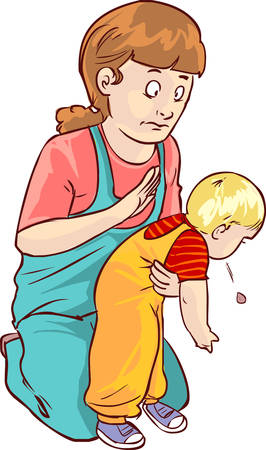1. Common Symptoms in the Second Trimester
The second trimester is often called the “honeymoon phase” of pregnancy because many women feel a surge of energy and relief from early pregnancy discomforts. However, this stage also comes with its own set of changes and symptoms. Here are some common experiences you may notice during your second trimester.
Increased Energy
Many moms-to-be find that their energy levels improve during the second trimester. Morning sickness usually fades, making it easier to eat well and stay active. If youre feeling more energetic, take advantage of this time to prepare for your babys arrival or engage in light exercise like prenatal yoga or walking.
Round Ligament Pain
As your uterus expands, the ligaments supporting it stretch, which can cause sharp or achy pain on one or both sides of your lower abdomen. This is known as round ligament pain and is a normal part of pregnancy. It often happens when you change positions quickly, such as getting up from sitting or turning in bed.
Skin Changes
Pregnancy hormones can bring noticeable changes to your skin. Some women develop a glow due to increased blood flow, while others experience dark patches on their face (melasma) or a dark line running down their belly (linea nigra). Stretch marks may also start to appear as your belly grows.
Common Second Trimester Symptoms Overview
| Symptom | Description | Is It Normal? |
|---|---|---|
| Increased Energy | A boost in energy levels as morning sickness subsides | Yes |
| Round Ligament Pain | Sharp or achy pain in the lower abdomen due to stretching ligaments | Yes |
| Skin Changes | Dark patches, stretch marks, and an overall pregnancy glow | Yes |
When to Call Your Doctor
While these symptoms are generally normal, its important to know when something might require medical attention. If you experience severe abdominal pain, persistent headaches, sudden swelling in your hands or face, or any unusual symptoms that concern you, dont hesitate to call your doctor.
2. Digestive Changes and Appetite Shifts
As your baby grows, your digestive system goes through some noticeable changes. Many moms-to-be experience heartburn, constipation, and an increased appetite during the second trimester. Understanding these symptoms and knowing how to manage them can help keep you comfortable.
Heartburn: Why It Happens and How to Ease It
Heartburn is common in pregnancy due to hormonal changes and your growing uterus pressing against your stomach. This can cause stomach acid to move up into your esophagus, leading to a burning sensation.
Tips for Managing Heartburn:
- Eat smaller, more frequent meals instead of large ones.
- Avoid spicy, fatty, or acidic foods that can trigger heartburn.
- Stay upright after eating—avoid lying down immediately after meals.
- Drink fluids between meals rather than with meals to prevent overfilling your stomach.
- If needed, ask your doctor about pregnancy-safe antacids.
Constipation: A Common Pregnancy Symptom
The hormone progesterone relaxes muscles during pregnancy, including those in your digestive tract. This slows down digestion, which can lead to constipation. Iron supplements can also contribute to the issue.
Ways to Relieve Constipation:
- Increase fiber intake by eating more fruits, vegetables, whole grains, and legumes.
- Drink plenty of water throughout the day (aim for at least 8-10 glasses).
- Stay active—gentle exercises like walking can help stimulate digestion.
- If needed, talk to your doctor about safe stool softeners.
Increased Appetite: Eating for Two?
You may notice a stronger appetite in the second trimester as your baby grows and your body requires more energy. While it’s important to nourish yourself and your baby, balance is key.
Healthy Snacking Ideas:
| Snack | Nutritional Benefits |
|---|---|
| Greek yogurt with berries | Protein and calcium for bone development |
| Nuts and seeds | Healthy fats and fiber for sustained energy |
| Sliced veggies with hummus | Vitamins, minerals, and protein |
| Whole grain toast with avocado | Fiber and healthy fats for digestion support |
| Cottage cheese with fruit | Protein and probiotics for gut health |
If you find yourself feeling extra hungry, try focusing on nutrient-dense foods rather than empty calories. Listening to your bodys hunger cues and eating balanced meals will help maintain steady energy levels throughout the day.
Your digestive system is working hard to support both you and your baby. By making mindful food choices and staying hydrated, you can ease discomfort and feel your best during this exciting stage of pregnancy!

3. Growing Belly and Body Adjustments
As your baby grows, your belly expands, and your body goes through several changes to accommodate your little one. These adjustments can bring both excitement and discomfort. Understanding what’s normal can help you feel more prepared for the second trimester.
Back Pain
Many moms-to-be experience back pain as their center of gravity shifts. Your growing uterus puts extra pressure on your lower back, leading to discomfort. Here are some ways to relieve back pain:
- Practice good posture: Stand and sit up straight to reduce strain on your back.
- Use a pregnancy pillow: Sleeping with a supportive pillow between your legs can help ease discomfort.
- Wear supportive shoes: Avoid high heels and opt for shoes with good arch support.
- Try gentle exercises: Prenatal yoga and stretches can help strengthen your back muscles.
Stretch Marks
Your skin stretches to make room for your growing baby, which can lead to stretch marks. While they are common, not every mom gets them. Here’s what you need to know:
| What Causes Stretch Marks? | How to Minimize Them? |
|---|---|
| Rapid stretching of the skin due to weight gain | Keep skin moisturized with lotions or oils |
| Genetics play a role in whether you get them | Stay hydrated to improve skin elasticity |
| Hormonal changes affecting skin structure | Eat a balanced diet rich in vitamins C and E |
Changes in Balance and Posture
Your growing belly shifts your center of gravity, which may make you feel off-balance at times. You might also notice changes in posture as your body adjusts. Here are some tips to stay steady:
- Avoid sudden movements: Move slowly when standing up or changing positions.
- Use handrails: When going up or down stairs, hold onto something for support.
- Strengthen core muscles: Gentle exercises like pelvic tilts can improve stability.
- Avoid carrying heavy objects: Extra strain on your body can increase the risk of falls.
Your body is doing an amazing job adapting to pregnancy! While these changes can be uncomfortable at times, they are all part of the journey toward meeting your baby.
4. Emotional and Mental Well-being
The second trimester often brings a mix of emotions. As your body continues to change and your baby starts moving, you may experience mood swings, increased anxiety, or even a stronger emotional connection with your little one. These feelings are completely normal, but it’s important to recognize when they might need extra attention.
Mood Swings
Hormonal changes during pregnancy can cause sudden shifts in mood. One moment you may feel excited and happy, and the next, you might feel overwhelmed or irritable. These ups and downs are common, but if you find yourself feeling persistently sad or anxious, talk to your doctor.
Anxiety During Pregnancy
It’s natural to worry about your babys health, upcoming labor, or how life will change after birth. However, excessive worry or panic attacks may indicate prenatal anxiety. If anxiety is interfering with your daily life, don’t hesitate to reach out for support.
Feeling More Connected to Your Baby
As your baby grows and starts moving, many moms-to-be feel a deeper connection. Feeling those first kicks can be an exciting milestone! Take time to bond with your baby by talking, playing music, or gently touching your belly.
When to Call Your Doctor
If youre unsure whether your emotions are within the normal range or if they’re affecting your well-being, its always best to check with your healthcare provider. Here are some signs that you should reach out for help:
| Symptoms | When to Call Your Doctor |
|---|---|
| Extreme mood swings that impact daily life | If you feel out of control or unable to function normally |
| Persistent sadness or hopelessness | If these feelings last more than two weeks |
| Panic attacks or severe anxiety | If anxiety prevents you from sleeping or doing everyday tasks |
| Lack of interest in activities you usually enjoy | If you no longer find joy in things that used to make you happy |
| Thoughts of harming yourself or others | Seek immediate medical attention |
Your mental and emotional well-being is just as important as your physical health during pregnancy. Don’t hesitate to seek support from loved ones or professionals if you need it.
5. When to Call Your Doctor
During the second trimester, many symptoms are normal as your body continues to change. However, some signs could indicate a potential problem and require immediate medical attention. Its important to know when to call your doctor to ensure both you and your baby stay safe.
Warning Signs You Shouldnt Ignore
If you experience any of the following symptoms, contact your healthcare provider right away:
| Symptom | Possible Concern |
|---|---|
| Severe cramping or abdominal pain | Could be a sign of preterm labor or other complications. |
| Heavy bleeding or passing large clots | Might indicate placenta problems or miscarriage. |
| Dizziness or fainting | Can be caused by low blood pressure, dehydration, or other issues. |
| Sudden or severe swelling in hands, face, or legs | Might be a sign of preeclampsia, which requires urgent care. |
| Persistent headaches or vision changes | Preeclampsia can also cause these symptoms. |
| Painful urination or severe back pain | Might indicate a urinary tract infection (UTI) or kidney issue. |
Mild vs. Serious Symptoms
Some discomforts during pregnancy are common, but it’s crucial to distinguish between what’s normal and what needs medical evaluation. If youre unsure whether a symptom is serious, its always better to reach out to your doctor for guidance.
Mild Symptoms That Are Usually Normal
- Mild backaches that improve with rest
- Braxton Hicks contractions that go away with movement or hydration
- Mild swelling in feet and ankles (especially after standing for long periods)
- Nasal congestion due to increased blood flow
When in Doubt, Call Your Doctor
If something feels off or you’re worried about a symptom, trust your instincts. Your healthcare provider is there to help answer your questions and ensure you have a healthy pregnancy.


